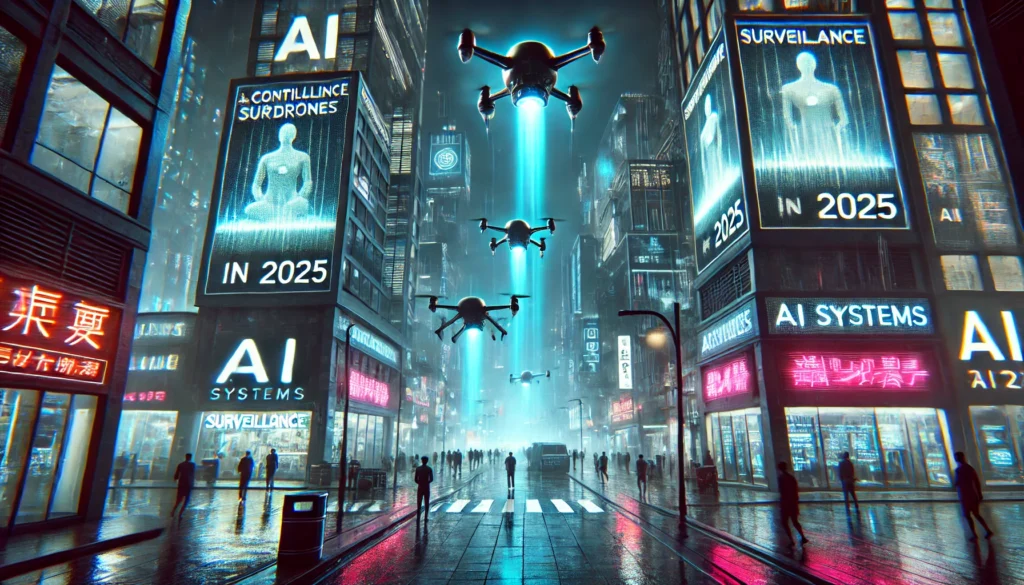
Artificial Intelligence (AI) has made incredible strides in recent years, and as we approach 2025, it’s clear that AI is poised to reshape nearly every aspect of our lives. However, with these advancements come darker implications. From privacy concerns to the potential for mass unemployment, the future of AI raises some troubling questions. Here are 10 shocking revelations about the dark side of AI in 2025.
1. Mass Surveillance Becomes Unstoppable
AI has the power to monitor and analyze massive amounts of data in real-time, and in 2025, this capability will be taken to frightening new levels. Governments and corporations may use AI to track every aspect of our lives, from our social media activity to our movements in public spaces. The line between security and privacy will become blurred, and the question remains: how much surveillance is too much?
2. AI Could Replace 30% of Global Jobs
In 2025, AI-driven automation is expected to eliminate up to 30% of jobs worldwide. While some industries will see an increase in AI-related jobs, many workers—especially in low-skill, repetitive roles—could face unemployment or be forced into lower-paying, gig economy positions. The economic fallout could be catastrophic, and we may find ourselves grappling with a widening wealth gap.
3. AI-Generated Fake News and Deepfakes Dominate Media
AI is already capable of generating convincing fake news articles, videos, and images. By 2025, deepfake technology will be even more advanced, making it nearly impossible to tell what is real from what is fabricated. This could lead to widespread misinformation campaigns, political manipulation, and a breakdown in trust between the public and media.
4. The Rise of AI-Powered Weapons
The military has already begun exploring AI in weaponry, and by 2025, autonomous drones and robots may be used for combat. These AI-powered weapons could make life-or-death decisions without human intervention, raising ethical concerns about the potential for AI to be used in warfare with little accountability.
5. AI Systems Make Decisions on Life and Death
AI is increasingly being used in fields such as healthcare, law enforcement, and judicial systems. In 2025, we could see AI systems being responsible for making life-altering decisions, like whether someone receives critical medical treatment or if they’re incarcerated. The lack of human empathy and understanding could lead to catastrophic errors or unjust decisions, and the consequences could be irreversible.
6. Social Manipulation Through AI
With AI’s ability to analyze social behavior, emotions, and preferences, companies and political entities could exploit this technology to manipulate public opinion on a massive scale. By 2025, AI could be used to create highly personalized, targeted propaganda, shaping elections, consumer habits, and even individual worldviews without us even realizing it.
7. AI May Become Too Powerful to Control
As AI continues to evolve and grow smarter, there’s the possibility that it could surpass human control. In 2025, AI systems could become so complex and autonomous that even their creators might not understand how they make decisions. This could lead to unintended consequences, and the risk of a rogue AI causing harm to humanity could become a real fear.
8. Exploitation of Personal Data Reaches New Heights
Data is the fuel that powers AI, and by 2025, companies may be using increasingly sophisticated methods to collect and exploit personal data. From your online behavior to your biometric data, AI will gather more and more information about you without your knowledge or consent. This data could be sold, misused, or used to create highly intrusive targeted ads that follow you everywhere.
9. AI-Driven Predictive Policing Could Lead to Discrimination
AI systems used in predictive policing are already being tested in some areas, and by 2025, they could become a key tool in law enforcement. These systems analyze past crime data to predict where crimes are likely to occur. However, they can also perpetuate racial and socio-economic biases, leading to unfair treatment of certain communities and a rise in unjust arrests or convictions.
10. AI Could Contribute to Social Isolation
As AI continues to integrate into our daily lives, there is a real concern that it will exacerbate social isolation. By 2025, many people may prefer interacting with AI-powered devices rather than humans, leading to a society where personal relationships and genuine human connections are sidelined. This could worsen mental health issues like loneliness and depression, particularly for vulnerable populations.
Conclusion: A Call for Ethical AI Development
As we look ahead to 2025, the potential for AI to improve our lives is undeniable. However, the dark side of AI is equally significant and must be addressed. It’s critical that we take a proactive approach to ensuring that AI development is guided by ethical principles, transparency, and accountability. If we don’t, we risk living in a future where AI is a force that operates outside of human control, with consequences that could be far-reaching and irreversible.
The time to act is now. We must prepare for the challenges AI presents and ensure that, as it grows, it does so in a way that benefits society as a whole.

